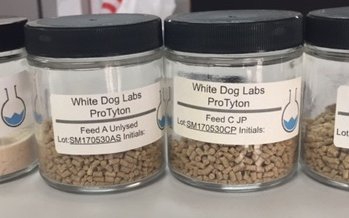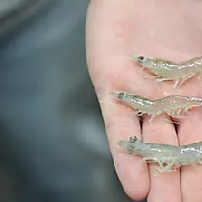The Center for Aquaculture Technologies in Canada (CATC) has demonstrated the potential benefit of ProTyton, a single-cell protein (SCP) from White Dog Labs, to shrimp farming. Initial studies demonstrated that inclusion of ProTyton into a CATC reference diet reduces mortality of whiteleg shrimp compared to a commercial diet when challenged by Vibrio parahaemolyticus (Vpa) – the aetiological agent of Acute Hepatopancreatic Necrosis Disease (AHPND), and commonly referred to as EMS.
"Once again, we are happy to announce these exciting preliminary results, which expand upon our previous studies with the CATC in Atlantic salmon and whiteleg shrimp,” said WDL's CEO, Dr. Bryan Tracy.
“As reported earlier, ProTyton inclusion in Atlantic salmon feed has the potential to reduce the overall cost of diets while maintaining high amino acid digestibility values,” said Dr. André Dumas, Director of Fish Nutrition at CATC. He added, “we then tested ProTyton in post larval shrimp diets. ProTyton inclusion (with a single replicate per treatment) doubled survival to over 80% and increased weight gain by 50% compared to the CATC diet.” Dumas commented, “Given these encouraging results we recommended to perform an AHPND challenge.”
The AHPND challenge was carried out by Dr. Mark Braceland, Director of Fish Health at CATC. Braceland said, “we acclimated shrimp to various diets over three weeks, then challenged with Vpa via per os (oral challenge), and then monitored survival over the course of a week.” Tested diets included a commercial diet that was optimized for shrimp disease resistance, a CATC reference diet and four test diets with up to 20% inclusion of ProTyton in the CATC diet. Mortality rates were 33 and 55% for the commercial and the CATC diets respectively, while the ProTyton test diets performed equal or better than the commercial diet.
Braceland commented “It is exciting to observe in this preliminary work that ProTyton addition to the CATC diet results in equal or better performance than the commercial diet for mortality. Moreover, three of the four ProTyton diets performed better than the commercial diet, and in two cases reduced mortality to a third that of the commercial diet. Further work is now planned to reconfirm and scale up ProTyton analysis, particularly in a model that is similar to field outbreaks.”
“We believe these health benefits are due to the anaerobic nature of ProTyton,” explained Tracy. He added, “It is known that anaerobic SCP can also contain immuno-stimulating secondary metabolites and nucleotides. Moreover, our ProTyton SCP also contains low levels of butyrate, a short chain fatty acid commonly used as a terrestrial feed additive to support gut health and reduce antibiotic use.”
ProTyton is currently being produced using a 5000-gallon fermenter at WDL’s Delaware pilot facility and is being evaluated by major aquafeed companies.
WDL has developed and scaled up ProTyton, which exhibits upwards of 85wt% crude protein and over 40wt% essential amino acids. The product is highly digestible, performs well in multiple aquaculture diets.
White Dog Labs (WDL)has signed a collaboration agreement with Midwest Renewable Energy (MRE) and will locate its first ProTyton plant within MRE’s ethanol plant in Sutherland NE. The ProTyton plant will initially produce 3,000 metric tons/year of ProTyton with shipments expected in Q4 2019. The plant will expand to 30,000 tons/year as early as 2021.
"Having demonstrated ProTyton benefits, we are now responding to customer requests and accelerating our time to market via the collaboration with MRE.” said WDL's CEO, Dr. Bryan Tracy.













